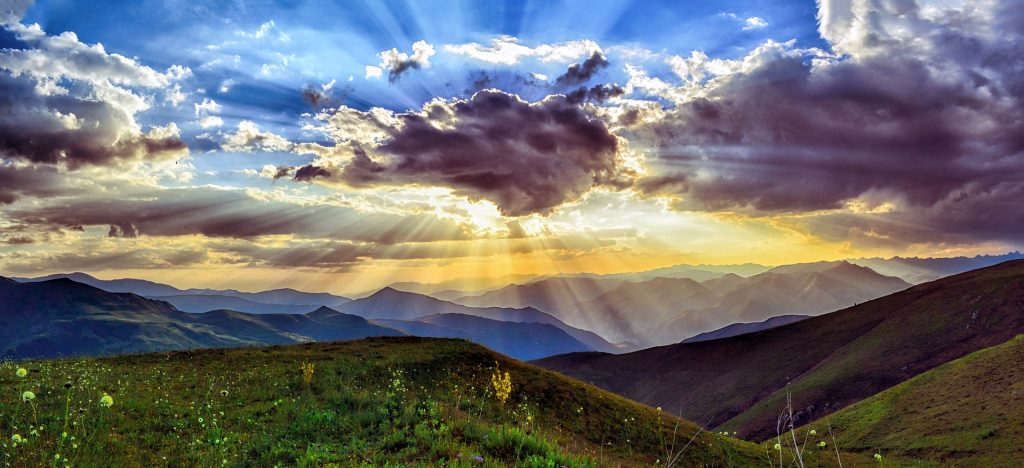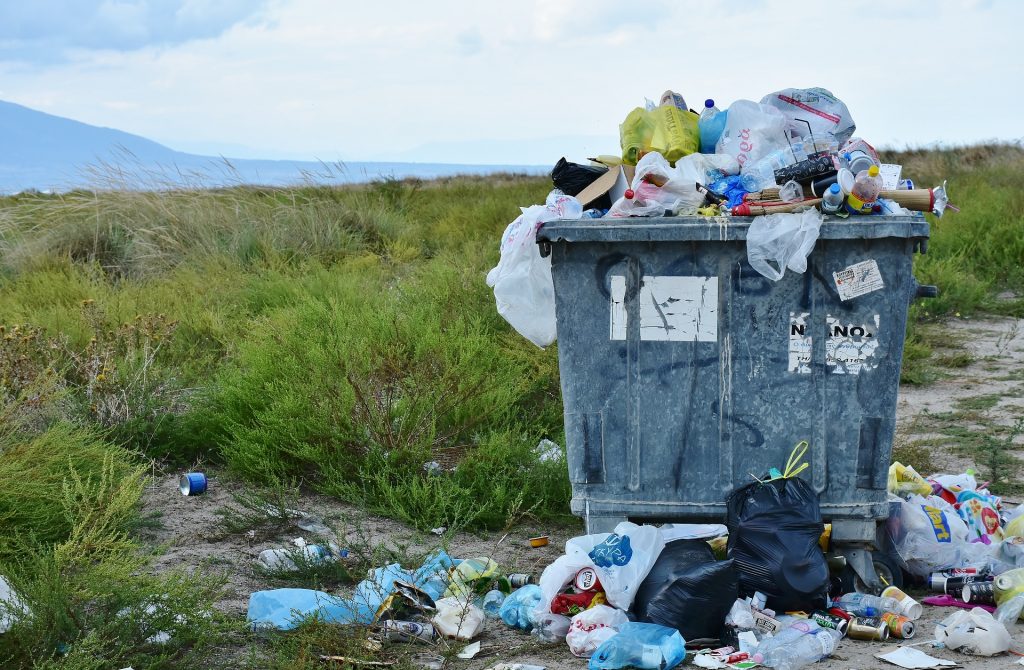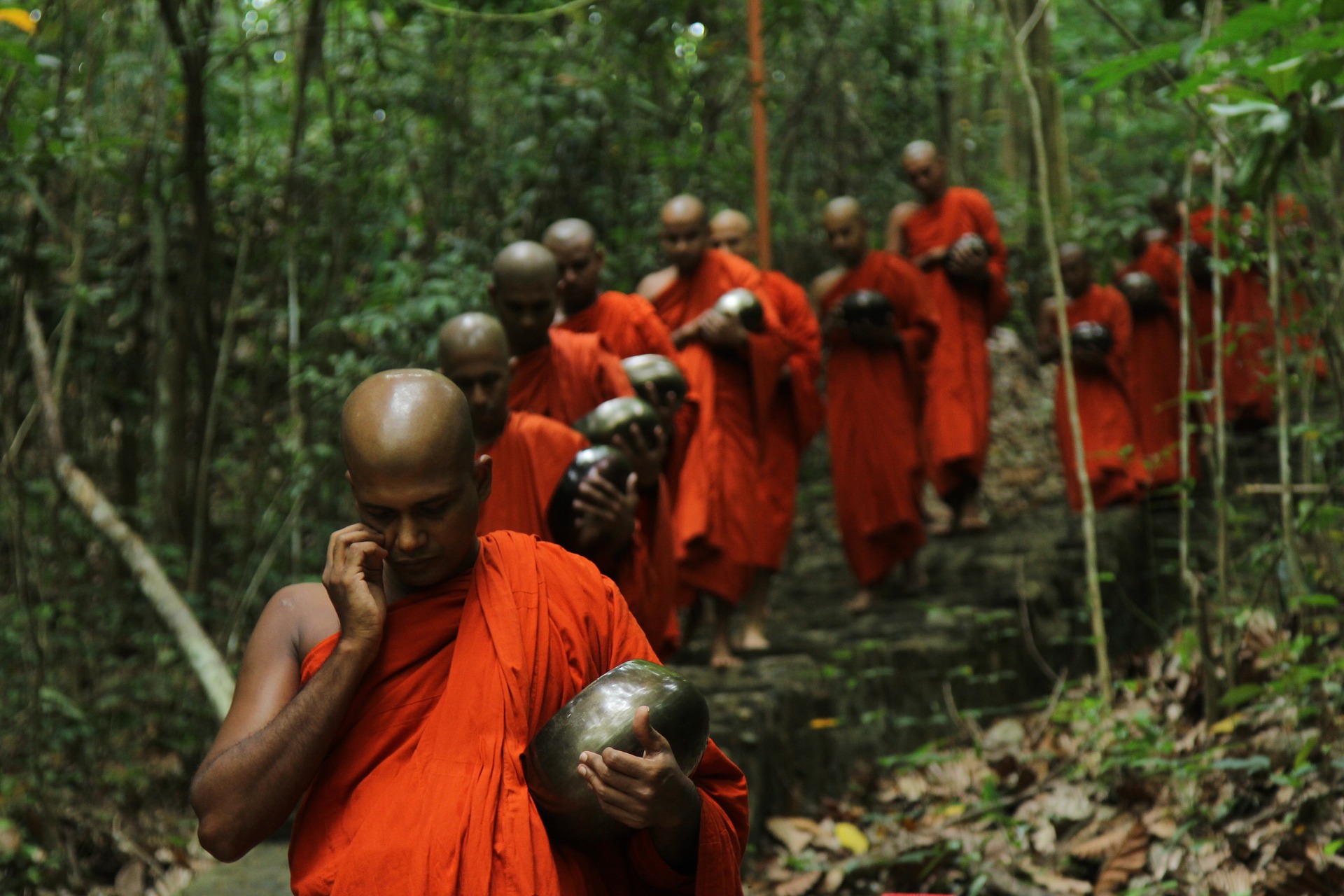If you knew in the next life you’d become a tree, you might hesitate before you cut one down.
Or if you were to become one of the ocean’s fish, perhaps you’d be more careful about how you dispose of certain plastics.
That’s Karma, at least as it’s applied in an environmental context, which might be a productive way to think about the decisions we make that contribute to the looming environmental crisis.
Nearly 80 percent of people around the world identify with a religious group. And whether those religions believe in reincarnation or an afterlife, they each have a wealth of insight on humans’ relationship and duty to the natural world that can help guide our future actions to protect and preserve the Earth.
In a 1992 address in New Delhi, India, the Dalai Lama spoke about nature: “If we exploit the natural environment in an extreme way, today we might get some other benefit but in the long run we ourselves will suffer, and other generations will suffer.”
In Buddhism, humans are just one form of sentient beings that are on a different level but are not fundamentally different than animals, plants or ghosts. So, modern Buddhists argue that not harming living beings means not harming any other living thing on Earth, be it forests or whales.
“Harming other beings creates bad Karma. So, in your next life, you’re born on a lower level,” explains Oliver Freiberger, an associate professor of Asian studies and religious studies at The University of Texas at Austin.
The goal, he says, is not to be reborn as something seemingly greater than human, but to escape this “suffering” world by overcoming our desires. Extending compassion to all sentient beings helps to achieve that goal.
“The modern world of capitalism and overconsumption is driven by desires,” Freiberger explains. “And succumbing to these things fosters egotism and impedes the escape from the cycle of rebirth and redeath.”
Sure, we can be reborn again and again. But what if the Earth won’t be around for our next life, or the one after?
“In the past, thinking about the earth in the past wasn’t a thing,” Freiberger explains. “The concept of ‘nature’ is very young. And today, religious scholars and leaders are looking to their old traditions for answers.”

In the Beginning
God defined parameters for how man should care for the world He created, but depending on which religion someone follows, expectations may vary.
According to a rather accusatory article by Lynn White published in Science in 1967, the Christian interpretation of creation is to blame for the current environmental crisis.
White based his argument in Genesis 1:26: “And God said, Let us make man in our image, after our likeness: and let them have dominion over the fish of the sea, and over the fowl of the air, and over the cattle, and over all the earth, and over every creeping thing that creepeth upon the earth.”
This verse, and on through Genesis 1:29, are the most damaging passages in terms of environmentalism, says Brent Landau, a lecturer in the UT Austin Department of Religious Studies whose work focuses on biblical pedagogies.
“This narrative presents two ideas: One, humanity is the pinnacle of creation; and two, humans have control, or ‘dominion,’ over nature,” Landau says, adding that if there was any question, verse 28 makes the sentiment of conquest clear: “…replenish the earth, and subdue it.”
Landau explains that while these are not strictly Christian texts, these programmatic claims were very important for the development of Christian thinking. Though, there are some hints towards environmentalism within these few verses that may have been overlooked.
For instance, nothing in the creation stories says that humans should eat meat. Genesis 1:29 actually says the opposite: “And God said, Behold, I have given you every herb bearing seed, which is upon the face of all the earth, and every tree, in which is the fruit of a tree yielding seed; to you it shall be for meat.”
It’s no secret that eating meat takes a huge toll on the environment. In a study published in Science earlier this year, Oxford University’s Joseph Poore found that while livestock produces just 18 percent of food calories and 37 percent of protein, it uses 83 percent of the world’s farmland and contributes to nearly 60 percent of agriculture’s greenhouse gas emissions.
“The first time man was told to eat meat was in an act of sacrifice after the great floods,” Landau explains.
But the Bible offers more than these few verses for its readers and followers to shape their lifestyles and environmental concerns around.
Stewards of the Earth

Genesis 2:15: “And the Lord God took the man and put him into the Garden of Eden to dress and keep it.”
“This is the most influential concept in terms of man’s relationship with nature,” argues Jonathan Schofer, an associate professor of religious studies and an ethicists and expert on the Hebrew Bible. “This verse lays out the very foundational idea of stewardship.”
Before earning his doctorate, Schofer worked for an environmental nonprofit. His office, where he worked to create commercial recycling in a downtown business district in what is now Silicon Valley, was housed in the same building as the original Earth Day.
“In Judaism we talk a lot about this world and ‘the world to come,’” Schofer describes. “So, the aim is to create harmony between humans and the earth to allow for a prosperous society for today and future generations, which involves agriculture and bountiful trees.”
As stewards, Jewish followers are encouraged I’vadah ul’shamrah, “to till and to tend.” Where there is harmony between the individual, society and the earth, rain will come, and all will prosper.
Within this tradition, some rabbis teach that if a man is planting a tree when the messiah comes, he should finish his work before going to meet him. Planting trees will create a more fruitful world for future generations, just as our ancestors did for us.
In considering how to make things better for the world to come, Schofer describes three forms of modern religious environmental ethics. The first is human-centered environmental ethics, which reasons that we should manage our resources for our society’s benefit. The second puts more emphasis on the rights of the natural world, recognizing that animals and nature should be protected and looked after for their own intrinsic value. And the third is the idea of deep ecology, which regards human life as equal to other components of the global ecosystem and requires humans to learn from and have humility before the power of nature.
What the Hands of Men Have Wrought
Like Judaism, Islam calls for harmony and balance between humanity and nature. And the Qur’an offers an ominous view of how humans may have disrupted that balance:
Qur’an 30:41: “Corruption has appeared in the land and the sea on account of what the hands of men have wrought. That He may make them taste a part of that which they have done, in order that they may return.”

“What the hands of men have wrought” may be interpreted as social and moral corruption in the form of overconsumption, wastefulness and overexploitation of natural resources. The Qur’an calls on its followers to amend their actions so that harmony and balance can be restored.
“God does not love the wasteful. God does not love the extravagant,” says Hina Azam, an associate professor of Islamic studies at UT Austin. “There’s a lot of potential for environmental responsibility in Islamic teachings that haven’t yet been developed within the frame of sustainability.”
She recalls past visits to her family in South Asia where she would have to bathe using only a bucket of water, so as not to waste any. “You’d be amazed at how little water it actually takes to wash your body,” she explains.
In recounting her relatives’ home life, she highlights their fondness for home gardens, grown, maybe, to reflect the image of Heaven — described in Qu’ran as a garden. Like Judaism, planting trees holds great significance in Islam. One hadith — prophetic saying — states: “If a Muslim plants a tree or sows seeds, and then a bird, or a person or an animal eats from it, it is regarded as a charitable gift (sadaqah) for him.”
“If you have land that can be planted, it should be planted,” Azam paraphrases Islamic Law. “Anything that is productive should be made productive.”
She describes how much of Muslim culture celebrates and evokes a sense of the natural world. Some chapters of the Qur’an are named for animals, and Muslim home decorations and even Arabic calligraphy dances with imagery of flora and fauna. Qur’an 6:38 reads: “And there is no creature on [or within] the earth of birth that flies with its wings except [that they are] communities like you…Then, unto their Lord they will be gathered.”
“Everything is created by God, and we are a part of nature,” Azam offers. “Humans are distinguished only by our moral responsibility.”
An Enlightenment
What that responsibility is exactly in terms of environmentalism is a new question for religious leaders around the world, and they’re answers are just beginning to scrape the surface.
In 2015, Pope Francis delivered the second encyclical of his papacy, Laudato Si(“Praised Be”). His first tackled moral issues, but the second took others by surprise with its focus on climate change and the environment. He outlines the problem: “The earth herself, burdened and laid waste, is among the most abandoned and maltreated of our poor.”

Knowing the influence religious leaders could have, former World Wildlife Fund president Prince Phillip solicited the help of leaders from the five major world religions — Buddhism, Christianity, Hinduism, Islam and Judaism — inviting them to an open discussion with environmental and conservation organizations in 1986. The meeting took place at Assisi in Italy, the birthplace of St. Francis, the Patron Saint of Ecology, and later led to the establishment of the Alliance of Religions and Conservation (ARC) in 1995.
Today, ARC works with 11 major religions, drawing on holy books, sacred sites and other religious assets to design new approaches to forest management, organic farming and educational outreach.
“Our ancestors viewed the earth as rich and bountiful, which it is,” wrote the Dalai Lama in My Tibet (1990). “Many people in the past also saw nature as inexhaustibly sustainable, which we now know is the case only if we care for it.”
For much of history, religion and faith has guided the way humans live, think and behave. And when it comes to conservation, it could be the world’s saving grace.
